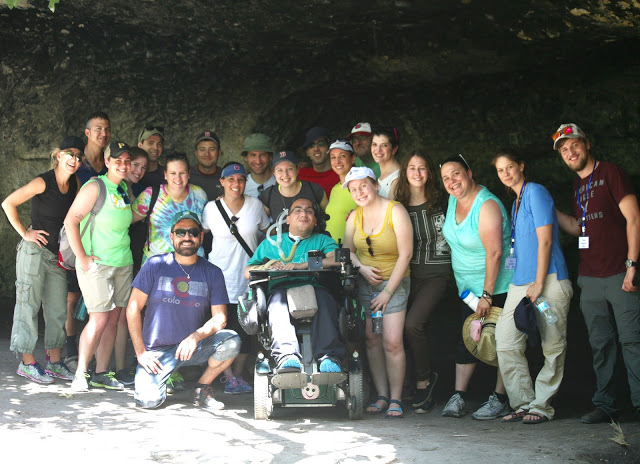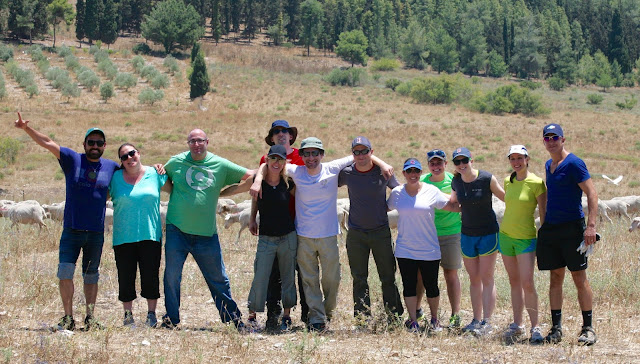Blog dev and testing page
H1 Title here
Teacher takes lessons from LOTEM, which makes nature accessible
Noah Arber

Categories: Impact Blog,
Tags: special needs,
Photo: Jack Roldan Noah Arber, in the tie-dyed shirt. |
JNF works all year to ensure no member of Israeli society is left behind through services for those with disabilities and special needs. During February, we join with the Jewish community at-large to mark Jewish Disabilities Awareness and Inclusion Month. Join us in learning about this important and vital work for all Israelis.
Last year, I took vacation time from work to travel to Israel and volunteer for Jewish National Fund. While you may have donated money to JNF to help plant trees in Israel, you may not know JNF does so much more to help Israel develop. During my time there, I spent every day doing volunteer work with a group of peers from around the country, as well as visiting various JNF sites and seeing the impact JNF has had on the development of Israel.
Although each day of our trip was unique, the day that stuck out most to me was the first, when we were privileged enough to work with an organization called LOTEM: Making Nature Accessible. LOTEM is the only organization in Israel that provides nature activities to both adults and children with special needs. I have a background in special education and it's something I'm extremely passionate about, so naturally I was moved by working with this organization -- and by working with them in a country that means so much to me.
LOTEM’s main objective is making Israel's nature and beauty accessible to all. A huge part of Israeli culture is hiking and spending time with friends and family out in nature, and LOTEM strives to make sure nature belongs to everyone. The organization expresses a belief in the core Jewish value of "klal yisrael" (literally meaning "the whole of Israel"), which embodies the concept of community and peoplehood among Jews.
When you're part of Israel and the Jewish people, you're a part of something greater than yourself and LOTEM strives to make sure individuals with special needs are included in this cultural phenomenon. LOTEM has created hands-on experiences so people can engage with nature through their various senses. For example, they can harvest wheat, but also help crush the seeds to make flour, and learn how to bake bread. Through these means, or "languages," LOTEM makes experiences accessible to all types of people.
During my time with LOTEM, I got to help harvest wheat, which was followed by a hike led by an individual in a wheelchair on the first inclusive trail in Israel. I was incredibly moved by my experiences with LOTEM and really connected a great deal to my experience working at Temple Emanuel Early Childhood Center in Kensington, Maryland.
More on inclusivity
Moved and awe-inspired witnessing Israelis with special needs
An inclusive society is a better society: How Israel weaves the disabled into its fabric
At our school, we believe in inclusivity and welcome with open arms a diversity of families. We view the children as capable and competent individuals, and focus every day, as LOTEM does, on their abilities rather than their "disabilities." Additionally, our school integrates the senses in hands-on ways and allows our students to engage in learning through a variety of modalities or languages. Lastly, like LOTEM, our school uses natural environments as an extension of our classrooms.
JNF and LOTEM are doing some incredible things for the Jewish homeland and the Jewish people. Through the last year, I have learned that similar to Reggio Emilia, Italy, which established a model educational system that supports children who could be marginalized, Israel has established a positive outlook on individuals with special needs and developed a society that has formed a similar view.
I hope to keep this vision with me as I continue to work with children with neurodiverse brains and keep in mind how to support each individual child so learning can be most "accessible" to their needs, strengths, and interests.
Teacher takes lessons from LOTEM, which makes nature accessible
Noah Arber

Categories: Impact Blog,
Tags: special needs,
Photo: Jack Roldan Noah Arber, in the tie-dyed shirt. |
JNF works all year to ensure no member of Israeli society is left behind through services for those with disabilities and special needs. During February, we join with the Jewish community at-large to mark Jewish Disabilities Awareness and Inclusion Month. Join us in learning about this important and vital work for all Israelis.
Last year, I took vacation time from work to travel to Israel and volunteer for Jewish National Fund. While you may have donated money to JNF to help plant trees in Israel, you may not know JNF does so much more to help Israel develop. During my time there, I spent every day doing volunteer work with a group of peers from around the country, as well as visiting various JNF sites and seeing the impact JNF has had on the development of Israel.
Although each day of our trip was unique, the day that stuck out most to me was the first, when we were privileged enough to work with an organization called LOTEM: Making Nature Accessible. LOTEM is the only organization in Israel that provides nature activities to both adults and children with special needs. I have a background in special education and it's something I'm extremely passionate about, so naturally I was moved by working with this organization -- and by working with them in a country that means so much to me.
LOTEM’s main objective is making Israel's nature and beauty accessible to all. A huge part of Israeli culture is hiking and spending time with friends and family out in nature, and LOTEM strives to make sure nature belongs to everyone. The organization expresses a belief in the core Jewish value of "klal yisrael" (literally meaning "the whole of Israel"), which embodies the concept of community and peoplehood among Jews.
When you're part of Israel and the Jewish people, you're a part of something greater than yourself and LOTEM strives to make sure individuals with special needs are included in this cultural phenomenon. LOTEM has created hands-on experiences so people can engage with nature through their various senses. For example, they can harvest wheat, but also help crush the seeds to make flour, and learn how to bake bread. Through these means, or "languages," LOTEM makes experiences accessible to all types of people.
During my time with LOTEM, I got to help harvest wheat, which was followed by a hike led by an individual in a wheelchair on the first inclusive trail in Israel. I was incredibly moved by my experiences with LOTEM and really connected a great deal to my experience working at Temple Emanuel Early Childhood Center in Kensington, Maryland.
More on inclusivity
Moved and awe-inspired witnessing Israelis with special needs
An inclusive society is a better society: How Israel weaves the disabled into its fabric
At our school, we believe in inclusivity and welcome with open arms a diversity of families. We view the children as capable and competent individuals, and focus every day, as LOTEM does, on their abilities rather than their "disabilities." Additionally, our school integrates the senses in hands-on ways and allows our students to engage in learning through a variety of modalities or languages. Lastly, like LOTEM, our school uses natural environments as an extension of our classrooms.
JNF and LOTEM are doing some incredible things for the Jewish homeland and the Jewish people. Through the last year, I have learned that similar to Reggio Emilia, Italy, which established a model educational system that supports children who could be marginalized, Israel has established a positive outlook on individuals with special needs and developed a society that has formed a similar view.
I hope to keep this vision with me as I continue to work with children with neurodiverse brains and keep in mind how to support each individual child so learning can be most "accessible" to their needs, strengths, and interests.
html content and images here
Some content and h2


